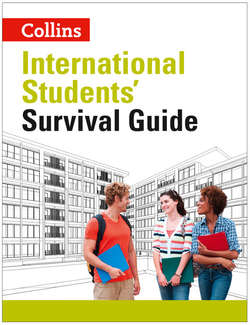Читать книгу International Students’ Survival Guide - Литагент HarperCollins USD, Ю. Д. Земенков, Koostaja: Ajakiri New Scientist - Страница 4
ОглавлениеIntroduction
Congratulations!
You’ve been accepted onto a college/university program in an English-speaking country! This is great news. You’re probably full of excitement and at the same time possibly a little anxious. This may be your first time away from home. It’s also likely that you’re changing from studying at a high school to undergraduate or graduate study which requires new skills. You may have lots of questions:
What will it be like?
What do I need to know?
How should I prepare myself?
What should I do or say?
How do I make the most out of my time studying abroad?
The information provided here will help you to make the move from your home country (where you live now) to the host country (where you’re going) as smooth as possible.
Who is this book for?
This book has been written to provide advice to anyone going to study (or already studying) in an English-speaking country. In this book, you’re called “international students” and the students who are from the country you’re studying in are called “home students” or “local students.” It’s likely that there are lots of other international students at the college/university. Some of these will be non-native speakers like yourself and others will be native speakers from other English-speaking countries. Some of the advice in this book helps you to make friends with other students, either other international students or home students.
Contents
If you look at the contents page, you’ll notice that the 20 chapters in this book are divided into four main sections that cover how to prepare before you leave, what to expect from college/university life, what it’s like studying in another country, and finally, how to prepare for the end of the semester/term or going home. Many people find going home as much of a change as arriving in a new country so the information in this section is important too.
Language
The language in this book has been graded so that it’s easier for learners of English to understand. If there’s a difficult word in the text, a definition of the word is provided in a box under the text. The definitions are taken from Collins COBUILD Advanced Dictionary which is a dictionary that is specifically written for learners of English. This dictionary may be useful to you while you’re studying abroad. You can access this dictionary for free at www.collinsdictionary.com/cobuild
Useful websites
The book also contains links to other useful websites to offer further help. That’s because the aim of this book is to act as your companion throughout your studies. Collins also has other resources that you might find useful. You can find these by going to www.collinselt.com.
Specific information
The authors who wrote this book are based in the US, the UK, and Australia so the book contains general information on studying abroad and specific information on studying in these three countries. Key terms used at college/university in the US, the UK, and Australia are included in this book.
Here are some examples of some of the key terms:
| US | UK | Australia |
| college | university | university |
| class | lecture | lecture |
| diploma | graduation/degree certificate | graduation/degree certificate |
| dorm/dormitory | halls/halls ofresidence | studentaccommodation |
| faculty | staff | staff |
| major | course | course |
| professor | lecturer | lecturer |
| semester | term | term |
| vacation | holiday | holiday |
Make the most of your time abroad
Between them the four authors have over 60 years’ experience working with international university students. They have watched many international students achieve success when studying abroad and they wanted to share their experiences and knowledge with you in this book so you can make the most out of the wonderful opportunity of studying abroad.
Jenny Siklós, Madison English as a Second Language School, Wisconsin, USA
Dr. Fiona Swee-Lin Price, Tamago Consulting: The intercultural education specialists, Melbourne, Australia
Els Van Geyte, University of Birmingham, UK
Anneli Williams, University of Glasgow, UK
